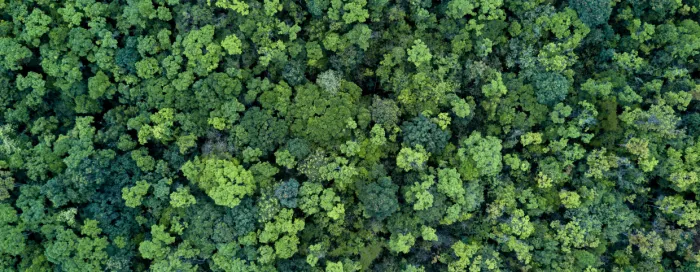We all know forests are essential to the survival of our planet, but not everyone knows that deforestation and forest degradation continue at an alarming rate. Even though the rate of deforestation has decreased during the last three decades, 420 million hectares of forest have been lost. The images of the Amazonian forest on fire or of devastating tragedies happening more and more often in Europe are all striking examples of what is happening to the world’s green lungs. The warnings of the experts are clear: forests are losing their ability to absorb carbon. In October 2019, the European Commission warned us: “Europe’s woodlands (are) removing less carbon every year because climate change makes wildfires more frequent, and because of higher harvesting rates aimed at satisfying increased demand for wood”. The COVID-19 pandemic is showing us another side of this story. According to experts from the United Nations, the World Health Organisation and the WWF International, pandemics are a direct consequence of “humanity’s destruction of nature”, which includes the devastation of forests.
The situation requires urgent action, as our member Roby Biwer (Local Councillor of Bettembourg in Luxembourg, and rapporteur of the European Committee of the Regions) calls for in his opinion “Stepping up EU action to protect and restore the world’s forests” adopted today: “Forests are the green lungs of our planet and we must care for them in the same way we care for our own lungs. We will not meet our climate and biodiversity targets without stepping up efforts to protect and restore the world's forests. We call on the Commission to be more ambitious. Encouraging is not enough.”
Some progress has already been made at EU level with the European Green Deal, the new strategy on biodiversity, the strategy called ‟From Farm to Fork” (the new Common Agricultural Policy) and all the international commitments the European Union has undertaken, including the 2030 Agenda for Sustainable Development (SDGs) and the Paris Agreement. It is nevertheless important to find coherence to align the efforts, objectives and outcomes produced by the different EU policies in a comprehensive sustainable strategy.
“When it comes to deforestation, no one gets to say that this is not our business too. Forests are a global public good. When healthy we all benefit, when burning we all suffer” #NYDF5Years #NYDFAssessment #EuropeanGreenDeal pic.twitter.com/qci2KiPPu9
— Frans Timmermans (@TimmermansEU) September 22, 2019
For quite a while now, the EU has established a wide range of policies targeting its 182 million hectares of forest (representing 5% of the world’s total forest area), but more needs to be done. “We need to guarantee the consumption of products from non-EU sustainable forestry supply chains in the EU, as the world's major primary forests are located outside the EU. Preventing forest loss and encouraging a sustainable forestry can have multiple benefits for people and ecosystems including biodiversity conservation, emissions reduction by carbon absorption and provision of ecosystems services that can drive sustainable growth,” adds Roby Biwer.
In this process, the cities and regions will play a key role. The opinion just adopted by the European Committee of the Regions highlights the necessity to put forward regulatory measures and recommendations for Member States and local and regional authorities, to effectively combat all forms of deforestation and degradation of the original forest ecosystems, rich in carbon and biodiversity.
Forests are the green lungs of our planet and we must care for them in the same way we care for our own lungs
— PES Group Committee of the Regions (@PES_CoR) July 1, 2020
We need to react and we can, indeed, react through the #EUGreenDeal and its ambitious objectives. Together we can bring about change!
—@BiwerR #CoRPlenary pic.twitter.com/mGcGtzXHik
It also insists on how the imports of our businesses, our actions as individuals, and our policy choices have a major impact on forests. Reducing the EU consumption footprint on land and guaranteeing the consumption of products from deforestation-free supply chains in the EU represents one of our Group’s main priorities. We believe that public procurement, accounting for around 14% of GDP in the EU, can be an important way to leverage the private sector to ensure more sustainable product supply contracts. The introduction of a ban on public purchases of products resulting from deforestation can produce relevant positive impacts on the promotion of deforestation-free products.
The European Union has an important role to play also when it comes to trade agreements: “When the EU negotiates trade agreements, their chapters on sustainable forest management and the fight against deforestation must be strengthened. If our partners do not meet their environmental and climate commitments, we shall be ready to react! The dramatic Amazon deforestation in Brazil shows that the EU-Mercosur trade agreement has failed until now in this regard,” adds Roby Biwer. The opinion calls on the EU and the Member States to suspend the ratification of the EU-Mercosur until the Brazilian Government reverses the trend of Amazonian rainforest fires. This would step up the action of some European governments and non-governmental organisations that are putting pressure to ensure the respect of human rights and of sustainability standards.
There is still a long way to go to protect and restore our forests. It is about time we take a harder and bolder position in order to prevent further catastrophes. Our call to the European Union institutions, to Member States and to businesses is to step up their action and work with us, cities and regions, to make sure that, together, we can save the only planet we have and create a more sustainable future.
